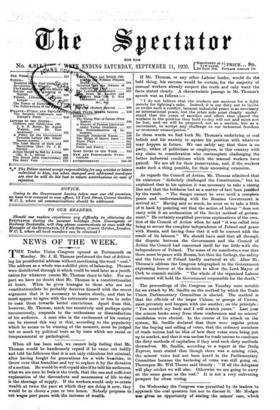As regards the Council of Action, Mr. Thomas admitted that
its existence " definitely challenged the Constitution," but ho explained that in his opinion it was necessary to take a strong line and that the boldness had as a matter of fact been justified by the result. " The danger cannot be over until a complete peace and understanding with the Russian Government is arrived at." Having said so much, he went on to take a little of it back by pointing out that the action of labour " does not carry with it an acclamation of the Soviet method of govern- ment." He certainly amplified previous explanations of the crea. tion of the Council of Action when he said " it was called into being to secure the complete independence of Poland and peace with Russia, and having done that it will be content with the result of its labours." We should have said that all through the dispute between the Government and the Council of Action the Council had concerned itself far too little with the independence of Poland. The sense of its manifestoes was that there must be peace with Russia, but that the feelings, the safety and the future of Poland hardly mattered at all. After Mr. Thomas's address the Congress telegraphed to the Government expressing horror at the decision to allow the Lord Mayor of Cork to commit suicide. " The whole of the organized Labour movement will hold the Government responsible for the death."


































